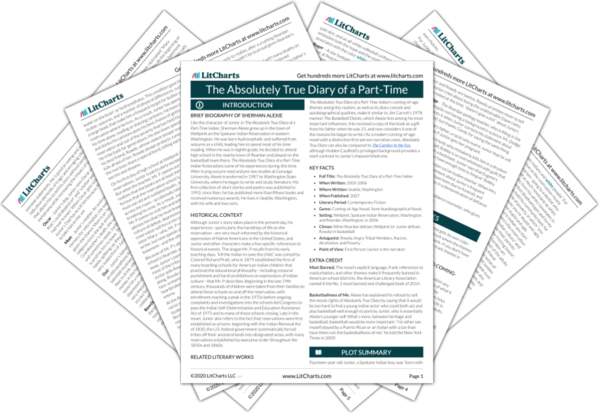Summary
Analysis
Although Junior’s friendships with Gordy and Penelope improve his school experience, he still feels like a stranger both in Reardan and on the reservation: “It was like being Indian was my job, but it was only a part-time job.” People in Reardan assume he has money because there’s a casino on the reservation, and so Junior pretends he isn’t poor in order to fit in.
Junior feels like an impostor because what people expect of him—acting white, acting Indian, or acting rich—conflicts with who he really is. His Indian identity feels like a job because he has to perform conflicting versions of it for his white classmates, whose understanding of “Indian-ness” is incorrect, and for his tribe, who feel he’s already failed some requirements of being Indian.
Themes
In December, Junior takes Penelope to the Winter Formal, which is complicated for him because he’s been trying to keep the extent of his poverty a secret from her. He has to meet Penelope at the dance (as opposed to picking her up) and shows up wearing his father’s old disco suit since he can’t afford to buy new formal clothes. Luckily, Penelope likes the suit, and the two of them have a great time.
While poverty again makes something that seems easy and natural for the other students especially difficult for Junior, it doesn’t stop him and Penelope from having fun together, proving that their relationship is more important than the difference in their backgrounds.
Themes
But Junior again feels nervous when Roger invites them along with his friends to drive into Spokane for pancakes, which Penelope is eager to do. Junior doesn’t have money to pay for pancakes, but he can’t say no to her. He hopes Earl, who has arrived to pick Penelope up, won’t allow Penelope to go. But Roger assures Earl that he will drive Junior and Penelope home, leaving Junior jealous of the way Earl trusts and respects Roger in addition to also being anxious about his lack of money.
“Penelope’s boyfriend” is another role that Junior feels pressured to play. While his feelings for Penelope are genuine, his sense that Roger “fits” better with Penelope recalls Gordy’s and Rowdy’s assessment of their relationship. Junior can’t help focusing on what he, Penelope, and Roger each represent in the high-school community, rather than who they are as individuals.
Themes
Halfway through the meal, Junior is so nervous about how he’s going to pay for the pancakes that he goes to the bathroom, worried that he might throw up. Roger comes in and hears him retching, and asks if he’s all right. Junior says he’s just tired, and the two boys chat for a while, with Roger inviting Junior to try out for the basketball team.
Interestingly, this scene parallels the scene in which Junior catches Penelope throwing up. In both cases, an unlikely friend arrives at a humiliating moment and inspires a reluctant confession.
Themes
Get the entire Diary of a Part-Time Indian LitChart as a printable PDF.

Amazed that Roger is being so nice—“he was POLITE! How many great football players are polite?”—Junior decides to confess why he was getting sick. Though he can’t bring himself to admit the whole truth, Junior tells Roger he’s lost his wallet. Without hesitation, Roger gives Junior forty dollars to cover his and Penelope’s food.
Though they’ve been cordial since their initial fight, Roger’s kindness in response to Junior’s partial confession is completely at odds with both his racist joke and Junior’s impression of who he should be as a popular athlete. For Junior, it demonstrates that people have complex identities that extend beyond their roles in the social hierarchy.
Themes
After the meal, Junior claims that his dad will pick him up at the school, and so Roger drops him off there and waits in the car while Junior and Penelope get out to say goodbye. Saying that Roger told her he lent Junior some money, Penelope asks Junior outright if he is poor, and Junior confesses the truth. He expects that Penelope will abandon him immediately, but instead, she kisses him on the cheek and promises that she and Roger won’t tell anyone and will be his friends.
This is another important moment of confession—just as Penelope has trusted Junior with her eating disorder, Junior is now trusting her with his poverty. Having told Penelope his secret, he can now trust that she likes him because of who he really is.
Themes
Under Penelope’s persistent questions, Junior also admits that his dad isn’t picking him up. Refusing to let Junior hitchhike home, Penelope tells Roger the truth. After that, says Junior, “Roger, being of kind heart and generous pocket, and also a little bit racist, drove me home that night … and plenty of other nights, too,” alleviating some of Junior’s transportation problems. Junior is still surprised that Roger is so nice because of the racism Roger displayed when they first met, but reflects that “If you let people into your life a little bit, they can be pretty damn amazing.”
Penelope’s and Roger’s responses to learning the truth about Junior’s poverty teach him the value of an honest confession, and relieve a lot of the pressure he feels to pretend to be someone he’s not. Junior learns that not only can many different elements exist in one person’s personality—Roger’s kindness coexists with his racism—but his friends can also appreciate the complexity of his identity too. What’s more, the way Roger and Penelope work together to help Junior shows that he’s finally earned a place in their community, and can enjoy the support that comes with it.
Themes












